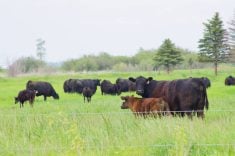Shearing sheep is a total body workout requiring plenty of stamina and technique as protesting lambs are flipped on their rumps and their heavy wool coats are clipped in a matter of minutes.
For the last 33 years this has been Cliff Metheral’s lifestyle.
Based in Nokomis, Sask., he has sheared sheep around the world but his bread and butter is earned in Western Canada, where he has handled as many as 20,000 head and traveled up to 40,000 kilometres a year.
Canada has a million sheep and trips between farms can be lengthy.
Read Also

House ag committee to undertake several studies
The House of Commons standing agriculture committee has set its agenda for the coming months. Members began the fall sitting with a two-hour update on international trade
“I get to see a lot of country and meet a lot of nice people,” he said.
“I only see them once a year but they’re almost like family. I’ve seen generations pass on the farm.”
Metheral was a contestant in the recent Calgary Stampede super shear off, where competitors came from Canada, United States and England to clip dozens of sheep in a series of timed events. Last year he won the World Sheep Federation shearing contest in Quebec City.
He grew up on a mixed farm in Ontario, where his father and brother sheared sheep. He learned from them and later travelled to New Zealand.
“That’s where I really became proficient,” he said.
In New Zealand Metheral learned a specific pattern of shearing and footwork to control the sheep and easily remove the wool.
He’s been kicked and bitten a few times but scoffs at any discomfort it may have caused.
As an experienced shearer he has started teaching others, including his son.
“I told him he had to learn to shear but he didn’t have to make a living at it,” he said.
Making a living has been a challenge in the last two years since BSE slowed the livestock trade. He figures his annual income has dropped by about $20,000, which has prompted him to make changes as he travels the country with his truck full of equipment.
“I’m still driving an old pickup.”
As well, wool has variable value. For fine fibre breeds such as Columbia and Rambouillet, wool sells for $1 to $1.50 per pound while wool from domestic breeds such as Dorset is worth 50 cents a lb. While domestic breed owners often break even after paying the shearer, the wool must be removed to keep the sheep comfortable.
At the Stampede, shearers use the tools provided and have a chance to win up to $2,000 for the overall prize. All contestants wear specialized shearing trousers to prevent lanolin in the wool from getting on their bodies and soft-soled moccasins to keep from slipping on the greasy floor.
Over the two-day event, contestants shear four sheep in each six-minute round.
Those with the highest scores move on to six sheep during the final eight-minute round. They are scored on absence of cuts on the sheep, appearance of the shorn sheep and timing.

















